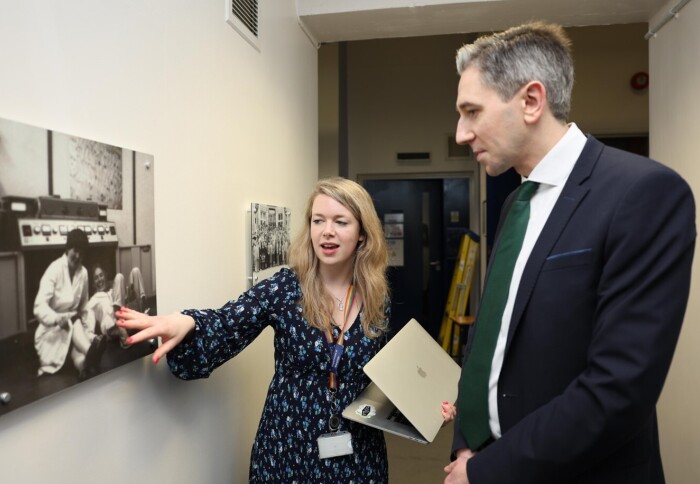Imperial welcomes Irish Minister to celebrate research collaborations

Ireland's Science Minister Simon Harris speaking to Dr Shelly Conroy
Ireland’s Science Minister visited Imperial College London this week to meet researchers and students.
Simon Harris, Ireland’s Minister for Further and Higher Education, Research, Innovation and Science, met Imperial’s President Hugh Brady to see the world-changing impact of the university’s science and innovation ecosystem. The Minister was joined at Imperial’s South Kensington Campus by Ireland’s Ambassador to Great Britain Martin Fraser.

First stop on the visit was the Imperial Centre for Cryo Microscopy of Materials - a unique facility driving new discoveries about materials that are critical to the energy transition, underpinned by a strong collaboration between Imperial and AMBER, the Science Foundation Ireland (SFI) Centre for Advanced Materials and BioEngineering Research.
The Minister spoke to Professor Alexandra Porter and Dr Shelly Conroy, both from the Department of Materials, about their research and heard from Dr Conroy about her experience of being awarded funding from SFI.
They then moved to the Dyson School of Design Engineering where researchers shared seven projects currently being run with Irish partners, including startups, UKRI-funded projects, and EU-funded projects. The Minister also met with 11 Irish undergraduate and postgraduate students who shared their experiences of studying at Imperial.
Max McCormack, President of Imperial College Irish Society, said: "Members of the Irish Society recently met Mr Harris over tea and coffee. He was curious to hear what led to us deciding to do our undergraduate degrees here, and what barriers we faced in applying abroad from Irish schools. We also talked about the Irish tendency to emigrate. Mr Harris remarked he believes most of us will ultimately return to Eireann."

At the Dyson School of Design Engineering, the Minister met with Professor Robert Shorten, Head of the Dyson School, as well as colleagues who are working with Irish partners. Some of the research projects highlighted during the visit included:
- iCircular3 – a project training PhD students on the integration of circularity in industry and the identification of cross-sector commonalities.
- Ebike Design – a project that is retrofitting electric bicycles with sensors that adjust the power assist in areas of higher pollution to help reduce the rider’s exposure to pollutants.
- CoDiet – a project that is trialing the use of innovative monitoring technologies, such as wearable smart-cameras and AI tools, to combat diet-related diseases.
The Minister also saw demonstrations of electric vehicle charging infrastructure from Go Eve, a startup created jointly by researchers from Imperial and University College Dublin (UCD). Go Eve raised £3m last year to carry out customer pilots on its multiple vehicle charging system following a successful project at Imperial in 2022. The company also has offices at NovaUCD in Dublin.

Imperial has valuable research and innovation ties with Ireland, with more than 1,500 articles co-published in the past five years with Irish institutional partners.
The university has 15 unique Horizon Europe projects with partners in Ireland, showing the importance of international collaboration in producing world-leading science and innovation research.
The UK and Ireland also recently launched a new research partnership, the Co-Centres programme, with £60m in funding allocated to support projects in Ireland, Northern Ireland and Great Britain, highlighting the UK and Ireland’s continued commitment to collaboration.
Image credit: Embassy of Ireland, London.
Article text (excluding photos or graphics) © Imperial College London.
Photos and graphics subject to third party copyright used with permission or © Imperial College London.
Reporter
Eleanor Green
Communications Division
Conrad Duncan
Communications Division